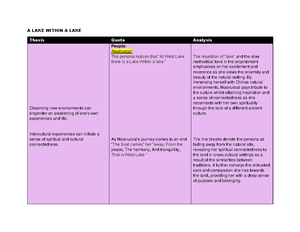- Information
- AI Chat
Was this document helpful?
All the Light We Cannot See Common Module essay
Subject: English standard
770 Documents
Students shared 770 documents in this course
Was this document helpful?

To what extent does the exploration of human experiences in All the Light We Cannot See
invite you to reconsider your understanding of courage?
"With courage, you will dare to take risks and have the strength to be compassionate." –
Keshavan Nair.
The postmodern historical polyvocal novel 'All the Light We Cannot See' (ATLWCS) (2014) by
Anthony Doerr seeks to reflect the complexity of courage through the myriad of influences
that Keshavan Nair aptly describes. Doerr challenges binary constructions of humans as
either good or evil within the context of WWII through the novel's exploration of the
opposing Allied and Axis powers. In turn, this allows a nuanced perspective of self-
empowerment within individuals such as Werner. Doerr reimagines the female narrative,
undermining traditional authoritative perceptions of gender in WWII to reveal "more that
unites us than divides us" through Marie-Laure. Clearly, through examining notions of
courage, the responder gains insight into two seemingly ordinary individuals in an
extraordinary collective experience of WWII. Ultimately, Doerr presents individuals as not
one-dimensional characters but rather multi-faceted beings who are strongly shaped by
their emotions and morality.
Challenging grand narratives of both 'good' and 'evil,' particularly regarding the German
collective guilt in WWII, Doerr reflects the courage present in individuals who abandon
unthinking conformity in place of their morality. Doerr complicates the perspective that 'all
Nazis were evil' through the characterisation of Werner, a German youth and innocent boy
"white as snow," yet an active Nazi soldier. He is told the nationalistic monologue of eating
"country and breath[ing] nation" to persuade children to conform to their prejudiced
attitudes. Despite the nationalistic propaganda that dominated this context, Doerr highlights
the ultimate price of conformity where he "waits for the child to blink...blink blink blink."
The palilogia of "blink" signifies the loss of morality and innocence when a young child
symbolically wearing a maroon cloak is murdered, signifying the victims of the Nazi regime.
The repetition in Doerr's language conveys the distress, price and courage in facing the
brutal realities of conforming to orders and succumbing to self-interest and fear. This lack of
certainty within his language illustrates how difficult it can be to differentiate between moral
and immoral actions within a state such as war. Ultimately, Doerr presents insight into the
courageous nature of individuals, disputing categorical and binary notions of 'good' and 'evil'
and empowering individuals to rise beyond their environmental conditions.
Furthermore, Doerr's storytelling challenges the binary understanding of both love and
sacrifice through the notion of parental guidance, presenting an insight into the crucial role
parenting has in shaping human qualities and emotions through meaningful interactions.
Through the parental figure of Daniel LeBlanc, Marie-Laure can find her strength and
courage within the most trying of times. The motif of the sea in the "seashell she holds in
her hands" and the Whelk symbolises the strength of LeBlanc's continual encouragement. In
contrast, the crucial importance of parenting is reflected through Werner's moral
degradation. Without the warmth of Frau Elena, who strongly presented her belief in him: "I
believe in you," Werner is left to submit to the oppressive violence of Bastien, showing how
he lacks the courage to make informed decisions without the moral guidance of







